This mushroom mad scientist helps make dinner even tastier at high-end Wichita restaurants
Eric Myers does not love mushrooms. He eats them once a week — at most.
“They’re not my favorite,” he said.
But he does love growing mushrooms, selling mushrooms, inventing machines that help others grow mushrooms, and making YouTube videos about mushrooms.
Myers, 37, is a bit of a mushroom mad scientist. The owner of Myers Mushrooms — a grow operation in Haysville that provides mushrooms to several high-end Wichita restaurants — Myers is an Air Force veteran, husband and father of two who a few years ago managed to make mushrooms his main gig.
His farm, which operates out of the big garage behind his house on the outskirts of Haysville, has all the complex equipment needed to turn oak sawdust pellets, soybean hulls and milo into plump shiitake, oyster, elm and lion’s mane mushrooms that can be used to dress up a restaurant pasta dish or to make medicinal tinctures.

The farm produces 100 to 200 pounds of mushrooms a week, but the mushrooms themselves aren’t the biggest part of the business. Myers is also an inventor who has designed and now sells various pieces of equipment used by farmers across the country to grow their own mushrooms. He’s also a wholesaler of mushroom-growing necessities, from boxes of ready-to-fill bags to blocks of ready-to-fruit mushroom matter. The items he sells to other farmers make up about 90% of his business, he said.
But what local diners are most interested in are the edible fungi that Myers peddles around town. He already has several fine-dining restaurants as customers, including Josh Rathbun at Lotte, 320 S. Market; Jason and Jordan Rickard at FioRito Ristorante , 3134 E. Douglas; and Siena Tuscan Steakhouse inside the Ambassador Hotel, 104 S. Broadway. Weekly, Myers delivers mushrooms that the chefs use to create their farm-to-table recipes.
He also recently started retail sales of both fresh and dried mushrooms. Customers who visit The Coop in both Derby and Wichita and all three area Wichita GreenAcres Markets can find Myers’ mushrooms and mushroom products on the shelves.
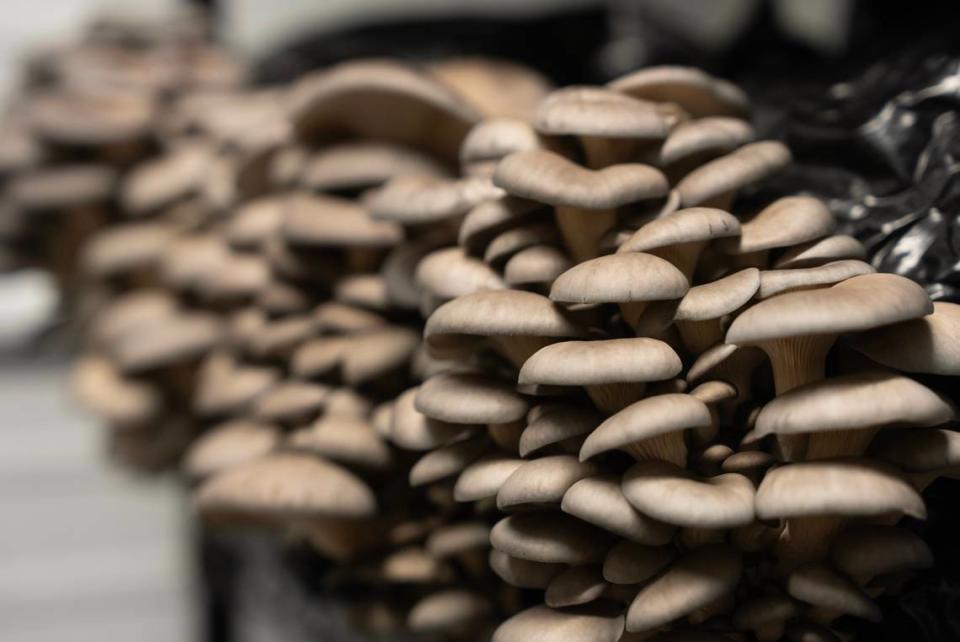
Jason Rickard, who opened FioRito with his brother, Jordan, in 2022, said they were surprised to discover Myers Mushrooms when they were planning their restaurant. In Denver, where both brothers worked early in their restaurant careers, fresh mushroom purveyors were everywhere.
But in Kansas? The brothers expected they’d be forced to use run-of-the-mill button or portobello mushrooms off their food purveyor’s truck.
“The fact that we have a farm that’s so amazing so close to us was something we didn’t expect,” Jason said. “His mushrooms are much better quality than most of the stuff you can buy at the grocery store, which are usually watery, spongy and flavorless. His blue oysters and shiitakes have much more of what you’d find in wild mushrooms — a drier, heavier texture with more depth of flavor.”
Born to grow
Myers grew up in Long Island and was raised by a mother who loved to garden.
As a boy, he was interested in gardening, too, and he appeared to have inherited his engineer grandfather’s mind for design.
“I pictured myself being a horticulturist, a grower. That’s what I wanted to do growing up,” Myers said. “I loved growing things my whole life. That’s definitely been something that’s been a passion of mine.”
He joined the military and was stationed in Germany, where he met his wife, Joana, also serving in the Air Force. Next was Andrews Air Force Base in Maryland, then Fort Bliss in El Paso. Myers spent most of his military career as a vehicle mechanic, working on everything from sedans to tractor trailers to aircraft refuellers. He also served in both Iraq and Afghanistan.
He was living in base housing in El Paso in 2015 when he decided to try and grow mushrooms in his garage for his family to eat. He watched videos, read online tutorials and joined grower Facebook groups. Soon, his grow was so successful that he was able to start selling mushrooms at the local farmers market. That’s where a chef from a local restaurant found him and started buying his mushrooms.
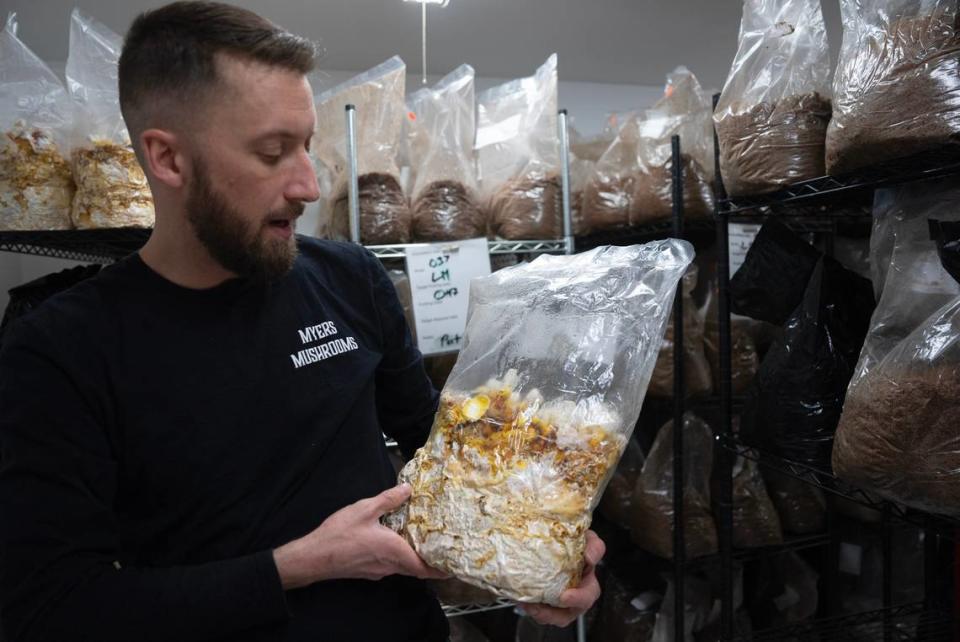
“With word of mouth, it just spread,” he said. “And ever since then, it’s just taken off.”
Myers was moved to McConnell Air Force Base in 2019 and then left the military in 2021. When he and his wife were looking for housing in the Wichita area, they purposely chose a property with a large garage where Myers would be able to continue his mushroom business, which now operates just behind his idyllic yellow modern farmhouse.
He’s expanded the garage over the years, and it now includes 3,000 square feet packed with equipment, sectioned off with a culture lab, an incubation room and a fruiting room, and outfitted with a USDA-inspected kitchen. (The attic of the space is packed with Myers’ other growing passion: cactuses.)
He was able to make Myers Mushrooms his full-time job three years ago, he said, and now, he spends his days not only growing mushrooms and selling mushroom-growing equipment but also offering mushroom-growing seminars and producing weekly YouTube videos where he shares his knowledge with other growers.
And Myers’ head is packed with mushroom knowledge. When he meets someone new, he immediately offers a tour of the farm, but he’s speaking a foreign language. Words fly out of his mouth — substrate, spawn, autoclave, mycelium, inoculation — and suddenly, you wish you’d paid closer attention in science class.
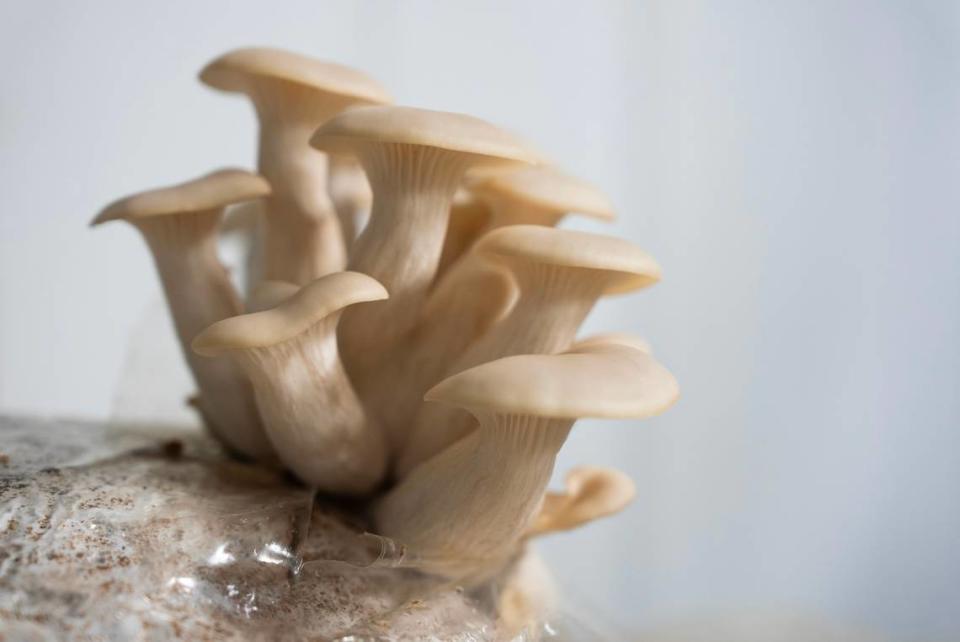
How to grow mushrooms
In the most basic terms, here’s Myers’ growing process: He buys milo locally, which he stores in a grain silo until it’s time to turn it into “grain spawn.” This process takes place in a massive pressure cooker he rigged up using a machine scrapped from a biotech company. The grain spawn goes into a sterile culture lab and is inoculated with a mushroom culture and put into a bag, where it will grow and multiply.
Next, using another machine he invented, Myers creates “substrate” — or the material the mushrooms will fruit from. He does it by mixing oak sawdust pellets (which supply carbon) and soybean hulls (which supply nitrogen) with hot water in a special bag. Those bags are then loaded into a stainless steel steam sterilizer that Myers also invented. He’ll run the steamers at 200 degrees overnight, and all the bacteria, spores and yeast will be killed off of the substrate. The bags are then unloaded into the lab and allowed to cool.
In the lab, Myers’ “spawn master” Keith Tucker then puts some of the grain spawn into the sterilized bags of substrate and mixes them up. The bags are moved to another room, where they sit side-by-side on metal shelves and colonize for days or weeks, depending on the variety of mushroom. The material in the bags will become colonized by white, fuzzy mycelium and will start to form baby mushrooms, which means they’re ready to fruit.
When that happens, bags are prepped for the fruiting room, which is kept between 50 and 65 degrees and at 80-90% humidity. Some mushroom varieties are left to fruit in their bags. For others, the bag is either stripped away or a slit is cut through it. Soon, clumps of mushrooms start sprouting, and they’re harvested either for sale or to be ground down for tinctures. The remaining material is then shredded and used for compost.
The tinctures, which Myers creates using a “soxhlet extraction” system that pulls beneficial compounds from the mushrooms, are also sold on his website, myersmushrooms.com, and at The Coop. People take them orally, and they’re said to provide a variety of benefits, Myers said: Lions Mane tincture for mental clarity. Reishi tincture for an energy boost. Cordyceps tincture for a feeling similar to caffeine. A two-ounce bottle of tincture sells for $25.
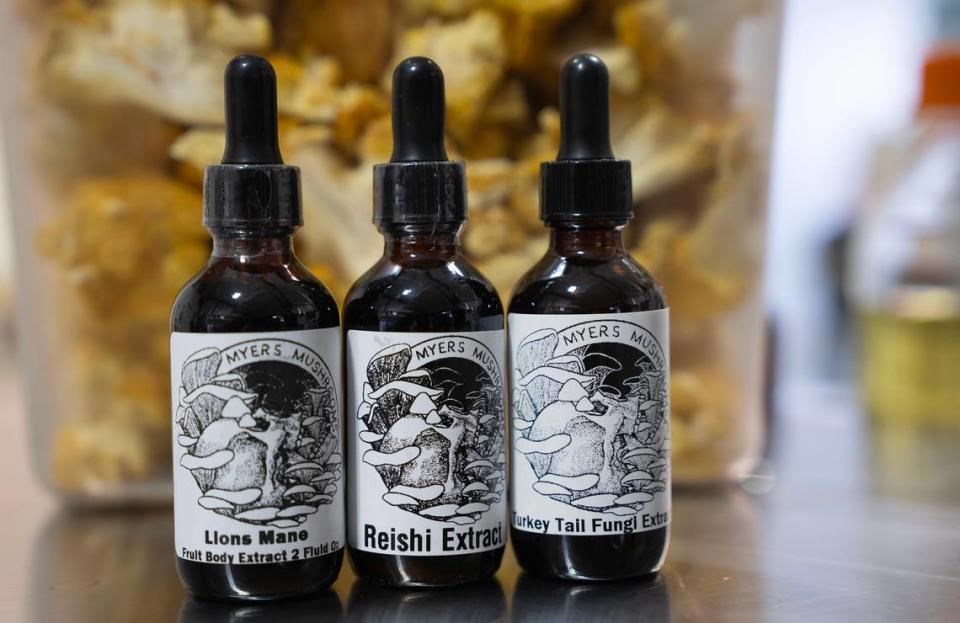
The future of superfoods
Myers says he doesn’t want to grow his business much larger. Though he loves providing restaurants with local produce — and was particularly impressed by a chicken-fried mushroom appetizer FioRito served using his mushrooms — he gets the most enjoyment from “tinkering” in his shop, inventing new equipment and helping aspiring farmers get their operations up and running.
Myers Mushrooms has only three employees — Myers and wife, Joana, who runs the shipping department, and a spawn master Tucker. He could use one more employee, he said, but that’s about it.
After all this time as an umami entrepreneur, Myers understands that mushrooms are controversial morsels. Though he loves a king oyster split in half and grilled on the stove top, he’s partial to other produce that comes from his garden.
But he also understands the health benefits of mushrooms, which are healthy, low-fat sources of protein that also have medicinal benefits.
Myers calls mushrooms the “future of superfoods.”
“I think it’s definitely something that people are learning more about,” he said. “’Here’s another whole kingdom — the fungi kingdom — that I’m not even ingesting.’ And some people are turned off immediately, but there’s definitely health benefits to eating mushrooms and having them be a part — even if it’s a small part — of your diet.”
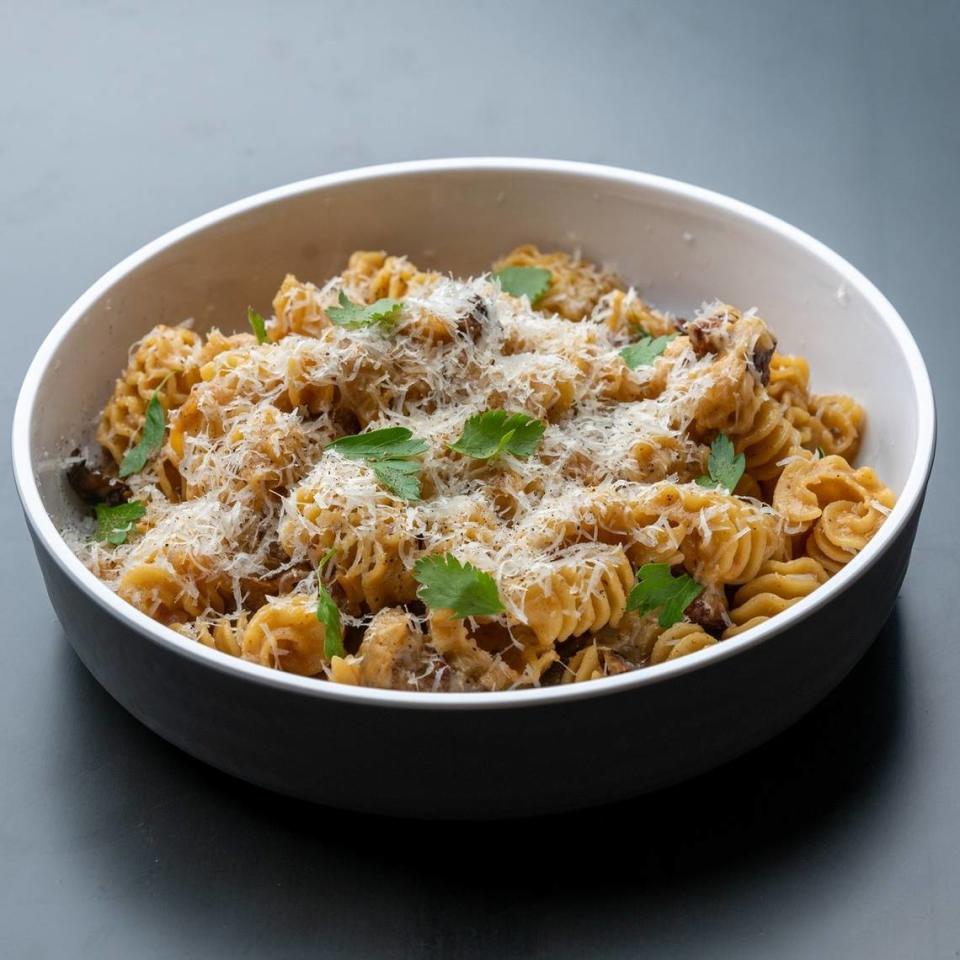
The Rickards, who like many other fine-dining chefs in town prefer to use local produce in their recipes, love Myers’ mushrooms for another reason: They’re available year-round. During winter months, when other crops are out of season, Myers’ mushrooms keep coming, and the quality is consistent.
Though they use the mushrooms for a number of dishes, one of the Rickards’ day-one menu mainstays utilizes them the best, Jason Rickard said. The French Onion Radiatore, a pasta dish with a French onion soup flavor profile, uses Myers’ oyster mushrooms, roasted, in place of meat, and even non-vegans love it.
“I also think that there’s a growing vegetarian and vegan presence in Wichita, and these higher quality mushrooms are something indicative of nicer restaurants and trendier places to eat,” Rickard said. “Having that be absorbed into our local restaurant scene is very cool.”

